For about 3 hours and 30 minutes early Saturday local time, Israel engaged in three waves of air strikes on military targets in Iran for what the Israel Defense Forces said was “months of continuous attacks” from Iran and its regional allies.
The strikes came weeks after Iran launched a barrage of missiles at Israel in retaliation for its assassinations of Hamas and Hezbollah leaders.
Saturday’s strikes, which Iran said killed four soldiers, hit military centers in the provinces of Tehran, Khuzestan and Ilam, according to Iran’s National Air Defense Headquarters. The IDF said its “mission was fulfilled.”
There have been no reports of Iranian nuclear facilities or oil fields being hit, targets that the U.S. had previously urged Israel to refrain from striking.
Iran downplayed the mission as mostly a miss. The National Air Defense Headquarters, in a statement shared by a state broadcaster, concluded the mission was “successfully intercepted” and resulted in only “limited damage.”
After the strikes, a senior Biden administration official said, “This should be the end of the direct military exchange between Israel and Iran.”
While the U.S. was made aware of the strikes ahead of time, it was not involved in the action, U.S. defense officials say.
Iran’s potential response to what Matthew Savill, military sciences director at the Royal United Services Institute, called the largest direct attack on Iran’s territory since the 1980s, remained unknown.
After the assault, Iran’s foreign ministry said Iran “asserts its entitlement and obligation to defend against external aggression,” but that it was committed to upholding its “responsibilities for regional peace and stability.” Iran previously stated it does not want a wider regional war.
The Biden administration has been working to limit the scope of Israel’s hostilities with regional powers, including opposing militant groups, proxies of Iran such as Lebanon-based Hezbollah, and Iran itself, with its estimated 600,000 troops and an arsenal of ballistic missiles, in hopes of thwarting a larger regional war.
Coverage on this live blog has ended. Please click here for the latest updates.
President Biden has been receiving briefings on the Middle East after Israel’s retaliatory attack on Iran and says he hopes this is the end of the direct fire between the two. NBC News’ Allie Raffa reports.
Iranian vice president says Iran will respond ‘at the right time and under suitable conditions’
Iranian Vice President Mohammad Reza Aref condemned Israel's attack, stating that any aggressor must “await a response” proportional to their actions, to be delivered at a suitable time, according to Iran's state news agency.
He made the remarks following separate meetings with Hamas and Hezbollah representatives in Tehran, where he visited the offices of the resistance movements to pay respects to recently assassinated Hezbollah Leader Hassan Nasrallah and Hamas Leader Yahya Sinwar, both killed by Israel in recent weeks.
Iran claims 'right to self-defense' after Israeli strikes, as U.S. pushes to stop hostilities
Three waves of pre-dawn strikes on military targets in Iran today completed Israel’s retaliation on Iran, the Israel Defense Forces said, in what U.S. officials and others hoped would be the last shot in a hostile exchange between the two regional powers that has had the world on edge for weeks, fearing a dangerous expansion of the war.
In a briefing following the attacks, a senior official of the Biden administration told reporters that “This should be the end of the direct military exchange between Israel and Iran.”
The official said this is the “very strong view” of the U.S. and “it’s been communicated to our partners throughout the region.”
Iran’s foreign ministry condemned the attack in a statement today, asserting Iran’s “inherent right to self-defense,” but added that the country will uphold its “responsibilities for regional peace and stability,” making no mention of imminent retaliation.
Harris supports Israel's self-defense while calling for de-escalation
Vice President Kamala Harris, after speaking with the President Biden and national security team, reiterated U.S. support for Israel’s self-defense while emphasizing the need for regional de-escalation.
During a press gaggle today in Michigan, a crucial swing state with a significant Arab American population, she highlighted ongoing U.S. diplomatic efforts, led by Secretary of State Antony Blinken, to end the war, release hostages, and work toward a two-state solution. Harris stated there is broad regional consensus, including from the U.S., on the importance of reducing conflict rather than escalating it.
What’s next after Israel’s retaliation strike against Iran?
Reporting from Beirut, Lebanon
Israeli airstrikes on Iran may signal the end of direct confrontations between the two nations, potentially shifting the conflict back to a proxy war involving groups like Hezbollah and Hamas. The escalation highlights regional complexities, with airstrikes demonstrating Israeli defense capabilities while U.S. involvement seeks to maintain stability and prevent further escalation.
Four soldiers killed in Israeli strikes on Iran, state news agency says
The death toll among Iranian soldiers increased to four, according Iran's state news agency IRNA.
Major Sajjad Mansouri and Sergeant Mehdi Naqavi succumbed to their injuries this afternoon, IRNA reported.
Iran's military said earlier that two soldiers had been killed in the strikes.
Arab nations condemn Israel attack on Iran
Arab nations in the Middle condemned Israel's strike on Iran in a series of statements released this morning.
Qatar and Saudi Arabia called the attack a “flagrant violation of Iran’s sovereignty,” while Iraq accused Israel of continuing its “aggressive policies.”
Jordan, one of the U.S.’ closest allies in the region, called the strikes a “dangerous escalation” that “threatens the stability of the region.”
Bahrain and Lebanon condemned the airstrikes in separate statements today.
IDF releases photos of what they say are Israeli Air Force planes departing for strikes in Iran
Reporting from Tel Aviv
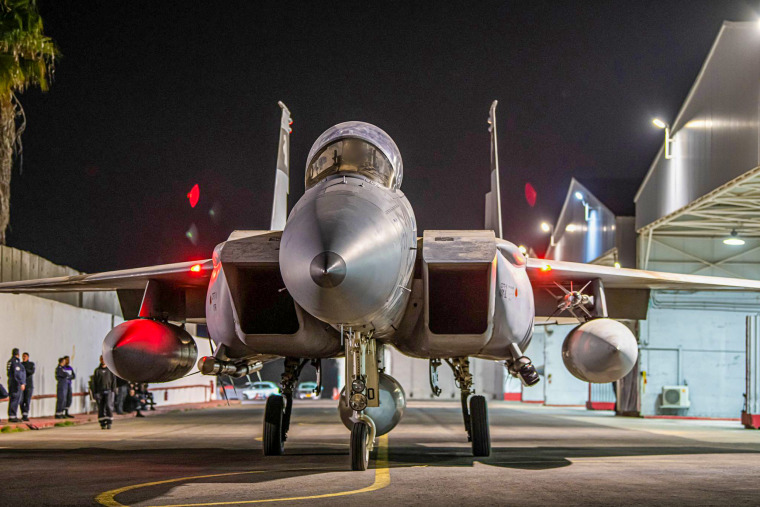
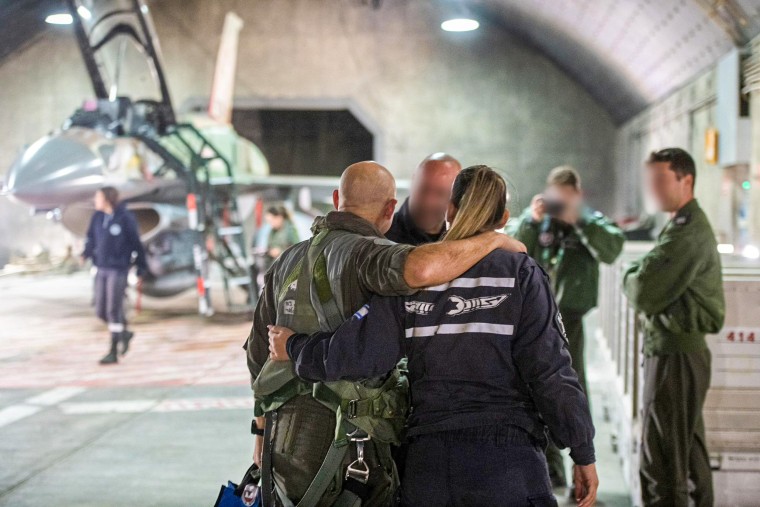
Iran faces dilemma over response to Israel attack, says analyst
Iran's leadership face a dilemma over whether or not to retaliate against Israel's overnight strike and risk further escalation, says Danny Citrinowicz, a research fellow at the Institute for National Security Studies.
The Israeli strikes appeared to be a limited attack aimed at deterrence, demonstrating military strength while avoiding a major escalation. While Iran has condemned the attack, it has made no mention of imminent retaliation, despite previous warnings of "harsher reactions" if Israel were to act against Tehran.
“A regional war is contradictive to anything that Iran is trying to achieve," Citrinowicz told NBC News. “Publicly speaking, Iran need to find excuses not to retaliate, because they obligated themselves before to respond to any Israel attack”
Citrinowicz added that there will be discussions behind closed doors about what steps to take, and he did not believe it would be easy to find consensus.
"I think that there will be discussions and people will argue from both sides, because the dilemma is there," he said. "Israel has offered a ladder for Iran to climb down the tree, but I’m not sure they will take it."
Former chief of staff at the CIA and Pentagon Jeremy Bash joins TODAY to discuss the potential long-term impacts of Israel’s retaliatory strikes against Iran.
Iran playing down attack is good news, says analyst
The fact that Iran is downplaying Israel's strikes on the country is "good news," says Yossi Mekelberg, a senior consulting fellow with Chatham House’s Middle East and North Africa Program.
Iran’s National Air Defense headquarters said this morning that its air defense systems successfully intercepted the attack, and that the strikes caused only “limited damage in certain areas."
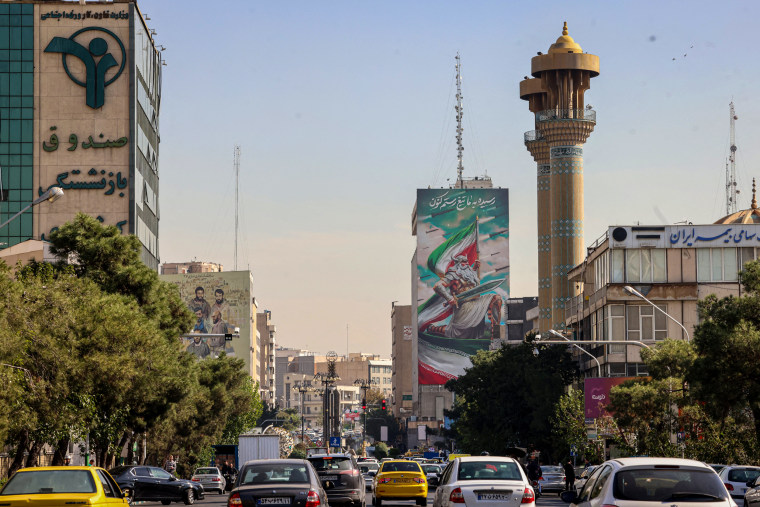
Mekelberg thinks that, while the full extent of the damage is still unknown, Iran's initial response opens the door to de-escalation.
“By them being dismissive about the damage, it gives them space to say ‘that’s done, scores are settled,’” he told NBC News today.
Mekelberg added that the end of any direct conflict with Iran, alongside the killings of leaders in the Iran-backed Hamas and Hezbollah militant groups, could open a path to move from military action “to the diplomatic, political sphere.”
“Whether Israel and Iran will think like this is a different matter,” he added.
‘Largest attack’ on Iran since war with Iraq, says analyst
Israel's overnight air strikes on Iran represented the largest direct attack on Iranian territory since the Iran-Iraq war in the 1980s, says Matthew Savill, Military Sciences Director at the Royal United Services Institute.
Savill said in a press release that while the attack was "more extensive" than the strikes Israel carried out in April, it was a "restrained response aimed at emphasizing Israel's conventional military superiority."
He went on to say the strikes looked like "putting a cap" on the conflict between Israel and Iran, but that underlying points of friction remained including Iran's nuclear program and proxy activity across the region.
Iranian foreign ministry asserts its right to self defense
Reporting from Tehran, Iran
Iran's foreign ministry said today that it "strongly condemns" Israel's overnight strikes on the nation, and that the attacks represented a "clear violation of international law."
The statement said that Iran "asserts its entitlement and obligation to defend against external aggression," and that it was committed to ensuring its security, but added that the country will uphold its "responsibilities for regional peace and stability." Iran had previously stated that it was not seeking a wider regional war.
The statement also repeated calls for the international community to stop Israel's "genocidal actions against Gaza and Lebanon."
Video shows Iran's air defenses engage Israeli strikes
A video posted on X appears to show Iranian air defenses intercepting Israeli projectiles over Tehran before dawn.
The footage, verified by NBC News, captures explosions in the sky and the sound of booms in the distance as interceptors likely met the Israeli missiles.
Local media reported the sound of air defenses firing overnight in eastern and central Tehran. In a statement issued after the attack, Iran's military said that its air defense systems successfully intercepted Israeli missiles.
Iran says two soldiers killed
Two soldiers were killed by Israel's air strikes on Iran this morning, according to a statement from the Iranian army and reported on state media.
Three provinces struck by Israeli strikes, Iran says
Israel attacked military centers in Iran's Tehran, Khuzestan and Ilam provinces, Iran's National Air Defense headquarters said this morning.
In a statement, it said Iran's air defense systems successfully intercepted the attack, and that "limited damage has been reported in certain areas."
It added that the scope of the attack was under investigation.
Iran resumes flights after Israeli strikes
Flights have resumed in Iran after a brief suspension following Israel's overnight strikes on the country, Tasnim, Iran's semi-official news agency said.
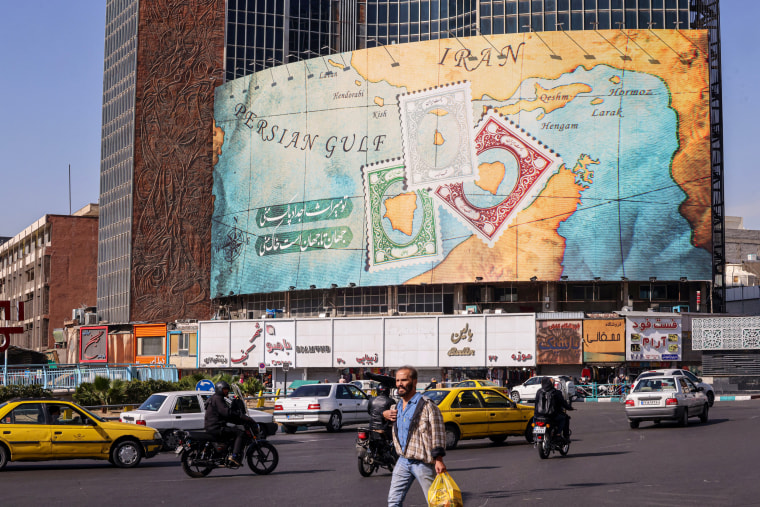
The report said that flights returned to normal at 9 a.m. local time.
Israel should have exacted 'heavier price,' says Israeli opposition leader
Israel's decision not to attack strategic and economic targets in Iran "was wrong," says Israeli opposition leader and former prime minister, Yair Lapid.
There have been no reports of Iranian nuclear facilities or oil fields being hit by Israeli strikes, and Israel said it had conducted "precise strikes on military targets."
"We could and should have exacted a much heavier price from Iran," Lapid wrote on X."
Defense Secretary Austin and Defense Minister Gallant spoke about strikes
U.S. Defense Secretary Lloyd Austin spoke with Israeli Defense Minister Yoav Gallant tonight about updates on Israel's strikes on Iranian targets.
During the call, Austin "emphasized the enhanced force posture of the United States to defend U.S. personnel, Israel, and partners across the the region," according to a readout of the call provided by Pentagon Press Secretary Maj. Gen. Pat Ryder.
The United States is determined "to prevent any actor for exploiting tensions," the summary of the call stated.
U.S. expects no further direct military exchange between Israel, Iran
Israel's targeted, retaliatory attack on Iran is expected to be the last of the back-and-forth, direct military action between the two countries, a senior official in President Joe Biden's administration said tonight.
"This should be the end of the direct military exchange between Israel and Iran,” the official said. “As far as we’re concerned that should close out the direct exchange between Israel and Iran.”
The official said this is the “very strong view” of the U.S. and“it’s been communicated to our partners throughout the region.”
The official said Biden and his security team "worked with the Israelis over recent weeks to encourage Israel to conduct a response that was targeted and proportional with low risk of civilian harm and that is precisely what transpired this evening."
In a call with Israeli Prime Minister Benjamin Netanyahu last week, Biden said any attack should be designed to deter further attacks against Israel and reduce the risk of further escalation, the official said.
"We do not want to see that happen," the official said, referring to any possibility Iran might respond.
The source emphasized that the United States had no direct role in Israel's strikes, which came "in multiple waves." But if Iran does target Israel directly, the United States has vowed to back its ally.
“Should Iran chose to respond we are fully prepared to once again defend against any attack," the official said.
Iran reports 'limited damage' from Israel's attack
Iran downplayed Israel's retaliatory offensive, saying it produced "limited damage" in certain areas, the country's National Air Defense Headquarters said in a statement shared by Islamic Republic of Iran Broadcasting, or IRIB.
"The country’s integrated air defense system successfully intercepted and countered this aggressive action, though limited damage has been reported in certain areas," the defense agency said in the statement.
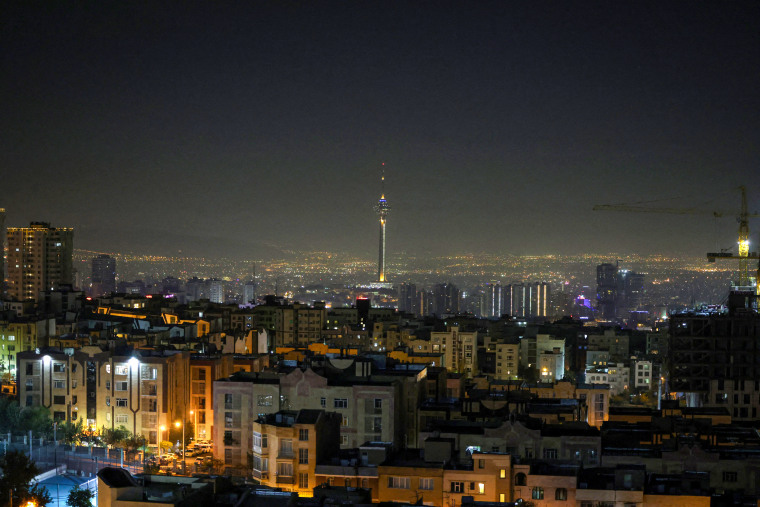
It acknowledged that Israel targeted military facilities in Tehran as well as in the provinces of Khuzestan and Ilam, calling it a "provocative attack."
The statement described Israel's move as "adventurous" and defying warnings not to aim for Iranian homeland targets. But there was no mention of a possible response.
"The scope of this incident is currently under investigation," the defense agency said.
Retaliatory strikes against Iran completed, Israeli military says
The mission against Iran has been completed, the Israel Defense Forces said in a statement.
"Our planes have safely returned home," it said.
The military forces described the attack as "retaliatory," naming Iranian missile attacks on Israel in April and October, but also noting the country's role in other attacks through proxy fighting forces.
"Iran acts to undermine regional stability," the IDF said.
Israel struck a number of targets, it said, including missile manufacturing facilities and surface-to-air missile arrays.
The strikes come amid Israel's ongoing war against Hamas in neighboring Gaza as well as its exchange of munitions with Iran-backed Hezbollah fighters in the north who doubled down on attacks against Israel following the eruption of war with Hamas.
Israeli attacks ongoing, sources say
The Israeli attacks on Iran are still ongoing, according to two sources familiar with the operation.
Austin spoke with Gallant, defense officials say
Two Defense officials tell NBC News that U.S. Secretary of Defense Lloyd Austin spoke with his Israeli counterpart, Yoav Gallant, tonight.
Harris briefed on Iran, White House official says
Vice President Kamala Harris has been briefed on Iran, according to a White House official.
She’s currently in Houston, where she will speak shortly at a campaign event.
Continued escalation could be used to show U.S.' dwindling influence in the region, former CIA director says
John Brennan, former CIA director and senior national security and intelligence analyst, says Iranian options for retaliation are limited after some of their resources have been depleted as a result of Iran’s recent military strikes.
“I think the Iranians recognize that their ability to do damage inside of Israel proper is really quite limited,” Brennan told NBC News’ Gadi Schwartz.
With the election less than two weeks away, Israel’s retaliation could have an impact on politics at home. Brennan said if the conflict continues to escalate, it would be difficult to see how there could be some kind of cease-fire in Gaza or Lebanon.
“Continued escalation here could be used as a way to show that U.S. influence division to be able to stop this is not as great as it once was,” Brennan said.
Biden has been briefed on strikes, officials say
President Joe Biden has been briefed on the strikes in Iran and is closely following the developments, two senior administration officials said.
The president is at his home in Wilmington, Delaware.
Strikes appear limited to military targets, senior administration official says
A senior Biden administration official has said that so far Israel's strikes appear to be limited to military targets and do not include nuclear or energy hubs.
During his trip this week to the region, Secretary of State Antony Blinken's urged Israeli Prime Minister Benjamin Netanyahu and Defense Minister Yoav Gallant to limit the targets, stressing that doing so could help end the cycle without escalating into a wider war.
A second official had said before the strike, the U.S. knew Israel had to retaliate but was urging Israel not to hit the more sensitive targets in hopes of breaking the retaliatory cycle.
No U.S. involvement in strikes, defense officials say
Three United States defense officials tell NBC News that the U.S. was given a heads-up before Israel launched strikes tonight on Iran.
The U.S. was not involved in the strikes, the officials said.
Israel not striking Iranian oil fields or nuclear facilities, official says
Reporting from Tel Aviv
An Israeli official told NBC News that Israel is not striking Iranian nuclear facilities or oil fields and is focusing on military targets.
“We’re targeting things that might have threatened us in the past or could do in the future,” the official said.
U.S. National Security Council aware of strikes in Iran
A spokesperson for the U.S. National Security Council said it is aware of Israel's strikes against Iran.
“We understand that Israel is conducting targeted strikes against military targets in Iran as an exercise of self-defense and in response to Iran’s ballistic missile attack against Israel on October 1st," spokesperson Sean Savett said in a statement.
Savett referred inquiries about the strikes to the Israeli government.
Initial strike targeted barracks, weapons depot, Arab sources say
Two senior Arab officials told NBC News that an initial strike on Tehran appears to have targeted a barracks or office and a weapons depot.
The Israel Defense Forces said it is striking military targets in Iran in response to attacks from "the regime in Iran."
Israeli military says it is conducting strikes on military targets in Iran
Reporting from Tel Aviv
The Israel Defense Forces said tonight that it is conducting "precise strikes on military targets in Iran."
The strikes, it said, were in response to months of attacks from Iran against Israel. World leaders have been awaiting Israel's response to a barrage of missiles that were fired from Iran at Israel on Oct. 1.
"The regime in Iran and its proxies in the region have been relentlessly attacking Israel since October 7th — on seven fronts — including direct attacks from Iranian soil," the IDF said in a statement. "Like every other sovereign country in the world, the State of Israel has the right and the duty to respond."
Iranian state media are reporting explosions inside the country’s capital of Tehran.
Islamic Republic of Iran Broadcasting, or IRIB, reported sounds of explosions in the city.
Israel is ethnically cleansing in Gaza, Jordan charges
LONDON — Jordan, one of the United States’ closest allies in the Middle East, confronted Secretary of State Antony Blinken on Friday with a stark and unwelcome assessment: Israel is ethnically cleansing Palestinians from Gaza.
Blinken was in London after holding meetings in Israel, Saudi Arabia and Qatar, during which he pressed the need for a cease-fire and the return of hostages being held by Hamas in Gaza.
“We do see ethnic cleansing taking place” in Gaza, Blinken’s Jordanian counterpart, Foreign Minister Ayman Safadi, said, speaking to the American delegation in front of journalists. “It has got to stop.”
Israeli strike kills three journalists in southeast Lebanon
The Beirut-based pan-Arab network Al-Mayadeen TV said two of its journalists were killed and Hezbollah-owned broadcaster Al-Manar said one of its camera operators was also killed in an Israeli strike that hit a compound housing journalists.
'Absolute sea of desperate people' lining up to get food in Gaza: Raf Sanchez
An NBC News crew was in the southern Gazan city of Khan Younis where they filmed a crowd of desperate civilians trying to get bags of bread.
The situation is worse in northern Gaza, where Israeli forces have been besieging the Jabalia refugee camp and hunger has been rampant.













